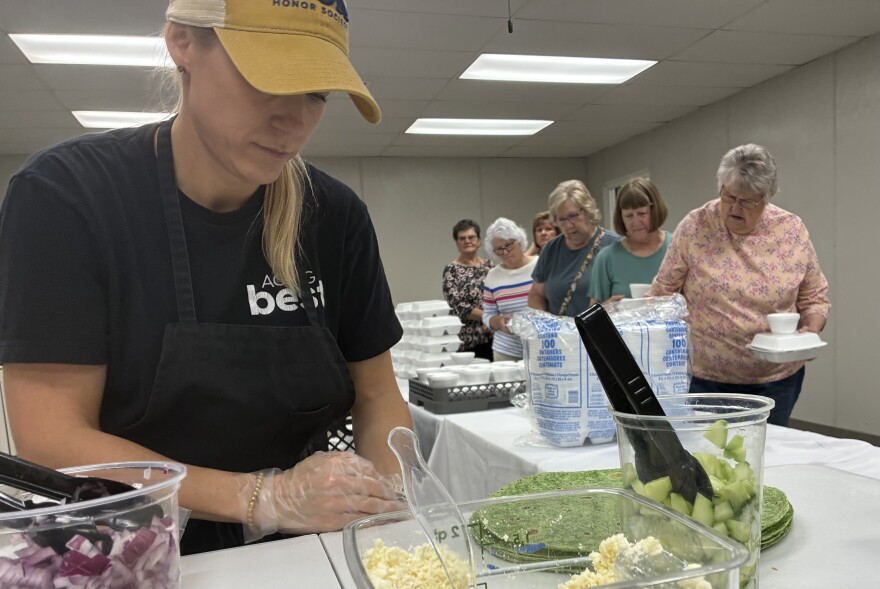About a 25-minute drive east of Jefferson City is Linn. It’s a rural town with a population of less than 1,500. The closest emergency room is back in Jefferson City.
Down a gravel road off Main Street is the Barefoot Event Center. Outside the door is a sign that reads “Senior Connections” in handwritten block letters.
Inside is a packed crowd of 30 people. Before last month, they didn't have a place to gather — and today, they're here for a meal.

"Had carrots in it," Mary Kling, 60, said. "I don't like carrots."
But these people aren't just here for a mango chicken wrap — carrots or none. They’re here for a connection.
On the M.O.V.E, the senior mobile center that hosted the event, travels to rural areas without a physical senior center. The program is run by Aging Best, a Columbia-based non-profit that’s part of the nationwide network Area Agencies on Aging.
Brenda Doyle manages On the M.O.V.E.
"We want to get people out of their homes," Doyle said. "Because there's no doubt that people that are homebound get very depressed."
Lacking social connection is as dangerous as smoking up to 15 cigarettes a day, according to a 2023 report from the U.S. Surgeon General. Americans have increasingly become less socially connected throughout the decades, but older adults have the highest rates of social isolation.

Spaces such as senior centers help foster connection between older adults, but rural areas can have a hard time keeping those places running. Linn has been without a senior center for at least a decade.
Dorothy Wolfe, who her daughter calls a “social butterfly,” loves people. She went to the first On the M.O.V.E event in August. Besides her cats Duchess and Thomas, she lives by herself.
“Togetherness,” Wolfe said. “[Getting] to do this together is very important.”
Julie Peetz, the executive director of the Missouri Association of Area Agencies on Aging, said fluctuating federal and state funding makes it harder for senior centers to thrive.
“We've seen the variation in some of the rural areas where they can't afford a standalone center,” Peetz said.
Mike Shaefer and his wife of 46 years, Gerri, attended the event for the first time. Shaefer said he noticed something similar happening at Jefferson City.
“I always thought, well, it'd be nice to be in our area,” Shaefer said. “Now it's in our area, so it's good.”

The program also offers support for seniors regarding navigating health insurance. A resource coordinator assists people with their Medicare Part D plans, which offers coverage for prescription drugs, and helps seniors sign up for Medicaid.
After most of the seniors finish their wraps and muffins, the organizers announce that it’s time for bingo. Quickly, the room goes quiet. The seniors focus on the numbers called. Some shout “Bingo!” as others either cheered or enviously groaned.
But Doyle said the community that is formed lasts much longer than the activities, themselves.
“We serve a meal, we play bingo or whatever they like,” Doyle said. ”The goal is to give people something to look forward to and to get out of their homes.”
On the M.O.V.E is continuing to expand its outreach in mid-Missouri. They plan to come back to Linn, and they hope the seniors will return, too.





